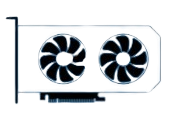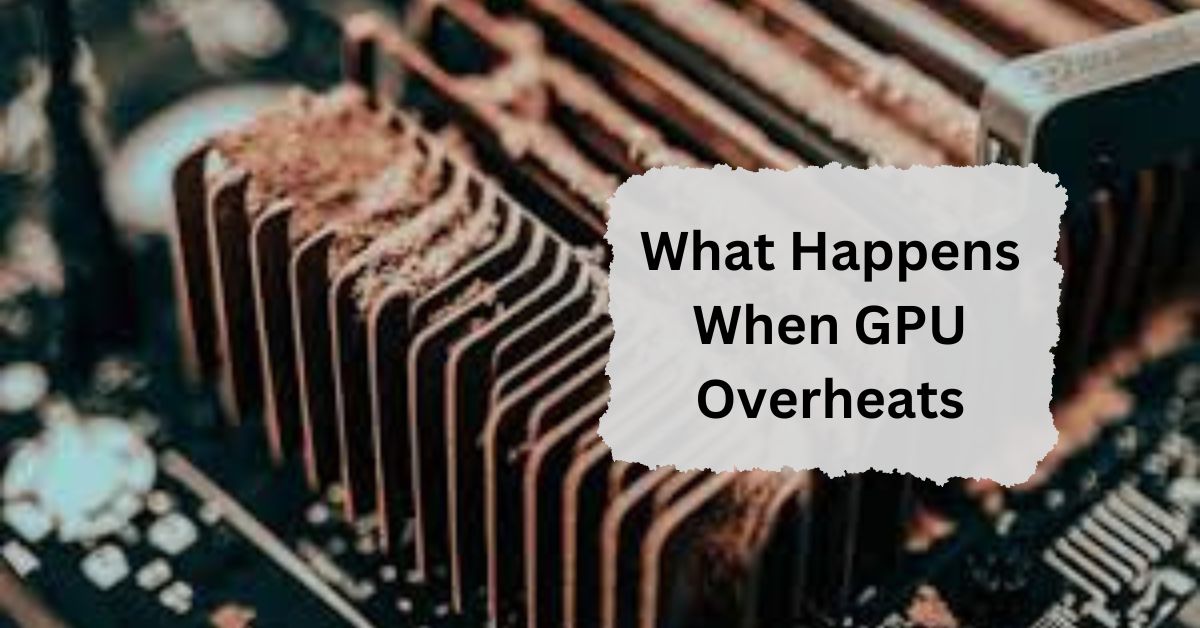Your GPU is the powerhouse behind your computer’s graphical output, and it can get pretty hot when it’s working hard. Keeping it cool is important for maintaining both performance and hardware lifespan. But what happens if your GPU overheats?
When a GPU overheats, it may slow down to prevent damage. The computer might freeze, crash, or shut down unexpectedly. Overheating can also shorten the GPU’s life and affect gaming or other tasks that need high graphics performance.
In this article, we will discuss “What Happens When GPU Overheats”.
What Is a GPU?
A GPU, or Graphics Processing Unit, is a critical part of any gaming or performance computer. It handles rendering images, videos, and animations, making it essential for tasks like gaming, video editing, and design. The harder it works, the more heat it generates.
Normal GPU Temperatures:
A normal GPU temperature while gaming or performing intense tasks usually ranges from 65°C to 85°C. If your GPU exceeds 85°C, it’s likely running too hot, and overheating is a concern.
Causes of GPU Overheating
Several factors can cause your GPU to overheat:
- Poor ventilation and dust buildup: If the airflow inside your PC is blocked or dust clogs the fans, your GPU won’t get the cooling it needs.
- Overclocking and high-performance tasks: Pushing your GPU beyond its default speed settings can make it run hotter than normal.
- Faulty cooling systems: If the cooling fans or thermal paste (the substance that helps transfer heat from the GPU to the cooler) fail, heat can quickly build up.
Symptoms of an Overheating GPU:
If your GPU is overheating, you’ll likely notice some tell-tale signs:
- Performance issues: Sudden drops in frame rates or stuttering during games.
- Unexpected shutdowns: Your computer may shut down to prevent damage.
- Visual glitches: Artifacting, such as strange colors, lines, or flickering on the screen.
What Happens When a GPU Overheats?
When a GPU overheats, the consequences can range from performance slowdowns to permanent hardware damage. The immediate impact is on performance and stability.
Throttling:
When your GPU overheats, it might throttle. Throttling means the GPU lowers its speed to cool down, which can cause games and applications to run slower.
System Crashes and Freezes:
If throttling doesn’t help, your system could crash or freeze. This is your computer’s way of protecting itself from the heat by shutting down entirely.
Permanent Damage:
Continuous overheating can cause lasting damage to the GPU. If the temperature remains too high for too long, the internal components may get damaged, requiring repairs or even a replacement.
How to Prevent GPU Overheating:
Preventing overheating is easier than dealing with the damage later. Here’s how:
Proper Airflow and Ventilation:
Make sure your PC case has enough airflow. You can install extra case fans or reposition the ones you have to create better airflow inside the case.
Regular Cleaning:
Dust buildup can block fans and vents. Regularly cleaning your PC, especially the GPU, will help maintain airflow and prevent overheating.
Adjusting GPU Settings:
If your GPU is running too hot, lowering graphics settings in games or turning off overclocking can reduce the strain on it. This simple adjustment can make a big difference.
Monitoring GPU Temperature:
Use software like MSI Afterburner or HWMonitor to track your GPU’s temperature in real time. This helps you catch any potential issues early before they cause overheating.
Can Overheating Be Fixed?
If your GPU is overheating, the first thing to do is let it cool down by turning off your system. Clean the fans and vents, ensure proper airflow, and consider applying new thermal paste if needed. If all else fails, upgrading your cooling system might be necessary.
Can overheating damage a GPU?
Yes, overheating can damage a GPU. High temperatures can lead to reduced performance, hardware failure, or permanent damage. Keeping the GPU cool is essential for its longevity and proper functioning.
What are the signs of GPU overheating?
Signs of GPU overheating include artifacts on the screen, sudden frame drops, crashes, and unusual fan noises. You may also notice the GPU temperature rising above normal levels while gaming or under heavy use.
How do I know if my GPU overheated?
Check the GPU temperature using monitoring software. If it exceeds safe limits (usually over 85°C), it likely overheated. Also, look for performance issues or unexpected shutdowns during intense tasks.
What happens if the GPU is too hot?
If the GPU is too hot, it can throttle performance, leading to lagging frames and stuttering. In severe cases, it may shut down or even get damaged, resulting in expensive repairs.
Can an overheating GPU cause shutdown?
Yes, an overheating GPU can cause the computer to shut down to prevent damage. This safety feature helps protect the hardware from overheating and permanent failure.
Can you fix overheating on a GPU?
Yes, you can fix overheating by cleaning dust from fans, improving airflow, reapplying thermal paste, or using a better cooling solution. Lowering graphics settings can also help reduce heat generation.
How to Tell If GPU Is Overheating?
Use monitoring software to check the GPU temperature. If it is above 85°C, it may be overheating. Watch for visual glitches or system crashes during demanding tasks as additional signs.
How to Cool Down the Overheating GPU?
To cool down an overheating GPU, clean its fans and heatsinks, improve case airflow, and adjust fan speeds. Consider using a cooling pad for laptops or installing additional case fans for desktops.
Why is overheating bad for a GPU (what does it do, exactly)?
Overheating can cause thermal throttling, reducing performance. It may also lead to hardware damage, short lifespan, or complete failure. Keeping temperatures in check ensures reliable and efficient GPU operation.
Will my computer shut down if my graphics card overheats?
Yes, if the graphics card overheats, the computer may shut down to protect itself. This is a built-in safety measure to prevent damage to the GPU and other components.
How Hot Is Too Hot for Your GPU?
Typically, a GPU temperature above 85°C is considered too hot. Regular gaming temperatures range from 60°C to 80°C. Maintaining lower temperatures is crucial for performance and longevity.
What happens when the GPU overheats gaming?
When the GPU overheats while gaming, it may throttle performance, causing lag, stuttering, or crashes. In extreme cases, it could lead to system shutdowns or hardware damage.
GPU overheating black screen?
A black screen may occur if the GPU overheats and shuts down to protect itself. This can happen during intense gaming sessions or heavy graphics tasks when the temperature rises too high.
Why is my GPU overheating all of a sudden?
Sudden overheating may be due to dust buildup, poor airflow, high ambient temperatures, or increased workload. Check for any recent changes in usage or environment that could affect cooling.
How to fix GPU overheating laptop?
To fix overheating in a laptop, clean the vents, use a cooling pad, and ensure proper airflow. Reducing graphics settings can also help. If problems persist, consider professional servicing.
FAQs:
What is the maximum safe temperature for a GPU?
Most GPUs are safe under 85°C, but it’s ideal to keep it below that range for long-term health.
How can I monitor my GPU’s temperature?
You can use software like MSI Afterburner, HWMonitor, or even some built-in BIOS options to monitor your GPU’s temperature.
Does overclocking always lead to overheating?
Not necessarily, but it increases the chances. Ensure proper cooling if you’re overclocking to prevent overheating.
Can thermal paste help with overheating?
Yes, reapplying thermal paste can improve heat transfer between your GPU and its cooler, reducing temperature.
Is replacing a GPU the only solution if it overheats too often?
Not always. Proper cooling, cleaning, or even reapplying thermal paste can fix the issue. Replacing the GPU is the last resort.
Conclusion:
In conclusion, keeping your GPU cool is very important. Overheating can lead to slow performance, crashes, and even damage. Regular cleaning, proper airflow, and monitoring temperatures can help prevent issues. If your GPU does overheat, take steps to cool it down quickly. Protecting your GPU ensures it works well and lasts longer.

I’m Noah Lucas, the voice behind the content you find here. With 5 years of experience in the GPU field, my goal is to provide clear and helpful information to everyone interested in this technology.
Whether you’re new to GPUs or looking to deepen your understanding, my articles aim to break down complex topics into simple, easy-to-understand language. This way, no matter where you’re from, you can find the information you need without any confusion.

